Yoga and Depression
By Michelle Chand
“Rest in natural great peace this exhausted mind, beaten helpless by karma and neurotic thoughts, like the relentless fury of the pounding waves in the infinite ocean of samsara.” Khempo Jamyang Dorje
The practice of backbends in yoga can be very uplifting, energising, challenging, exhilarating, and at times even a little painful (especially when you first start to play with them, as a backbend is not a position we use much in ‘real’ life, and if we are accustomed to slumping it feels even less natural!)
But for me, they are much more than a shape to be aspired to…..though some of them are beautiful to look at. For me they open my heart, lift my mood, they let in a glint of light, a sliver of hope when things feel bleak, and have given me respite from depression over many, many years of practice.
I have experienced depression, through most of my adult life and some of my childhood. I distinctly remember at the age of about eight realising that I was mortal, which meant everyone I knew including myself, and terrifyingly, my parents were going to die. And that is when it began. The sense of “Well, what’s the point of all this then??” I was admittedly an unusual child, highly imaginative and analytical, I had an imaginary horse, I worshipped peg doll gods that I made myself, and talked to ornaments (and I can’t see a single one of my students reading this being remotely surprised by any of those admissions…)
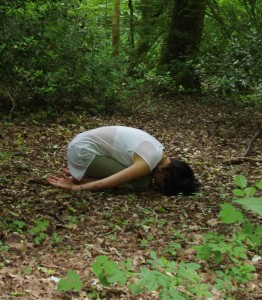
I am a bit of an open book, and can’t see the point of hiding who I am, especially if revealing aspects of myself, even when that could potentially leave me open and vulnerable, may help me connect with another human being who might, just might be suffering too. This openness has given rise in the past to people judging me, a) for being too open b) for admitting to having mental health problems, and that is absolutely their right and I am OK with them being who they are.
Strangely my experience of climbing out of depression and falling back into it nearly four years later was book-ended by two deaths.
Five years ago I lost someone very close to me. She too suffered depression, exacerbated by life events, a severe long standing and untreated eating disorder and alcoholism, and after a long and at times exhausting friendship, she died. Suddenly and unexpectedly. At the age of 45. It was not suicide: after years of neglect and abuse, her heart simply gave out one day while she was parking her car. And it was heart breaking, because just three weeks before the end she had sat on my knee and cried because she realised that she did want to live and began therapy and drying out in an attempt to save her life. It was just too late.
Strangely the death of my dear friend was the catalyst that made me confront, accept, and begin to wrestle with my own demons. I realised that I could easily end up the same way if I did not take drastic action to turn my life down a different path. I was very depressed, but somehow in the darkness decided to reach out for help. I chose intensive psychotherapy coupled with yoga and clean living as my medicine, as I did not want to resort to drugs, I was done with self-medicating and was afraid to use chemicals to balance my mental health. I am not, however, and please, please hear this, against the use of medication to alleviate depression.
I truly believed in my three part plan. I had to be clean living, and that was hard core. No alcohol, no cigarettes (yes I am a yoga teacher who smoked ho-hum) no stimulants of any kind, no drugs (legal or otherwise) good simple food. I lost a lot of friends during this transition, and spent many frustrating hours at parties sober and in my own mind listening to very drunk or stoned friends explaining to me that they didn’t have a problem and were OK as they were. I would quite like to have talked about something else to be honest. It was lonely, and I felt like a hermit crab that had left the too tight shell, but hadn’t yet found the next one: open, vulnerable and on the alert for attack! I decided I had to be in therapy long term, for it to correct the way I had knitted myself with so many dropped stitches and places where I clearly had not read the pattern correctly, and believe me I wanted to quit many times. M.Scott Peck explains the risk of commitment to therapy better than me, and he is a psychiatrist and very clever, so here are his words:
“The risk of commitment to therapy is not only the risk of commitment itself but also the risk of self-confrontation and change….there are difficulties associated with changing one’s map of reality, one’s world view and one’s transference. Yet changed they must be if one is to lead a life of love involving frequent extensions of oneself into new dimensions and territories of involvement. There will come many points on one’s journey of spiritual growth, whether one is alone, or has a psychotherapist as a guide, when one must take new and unfamiliar actions in consonance with one’s new world view. The taking of such new action – behaving differently from the way one has always behaved before –may represent an extraordinary personal risk …a risk more personal and therefore frequently more fearsome and frightening that that of a soldier entering battle. The soldier cannot run because the gun is pointed at his back as well as his front. But the individual trying to grow can always retreat into the easy and familiar patterns of a more limited past..”
And that is why I stayed, because I did not want to retreat into the easy and familiar. Like the Knight in the famous Monty Python sketch, I battled my demons , sword in mouth, shrieking
“Come back and take what’s coming to you! I’ll bite your legs off!”
(If you haven’t seen it….www.youtube.com/watch?v=2eMkth8FW …….FYI not suitable for kids or the easily queasy)
And then there was my yoga. The third leg of my three legged stool. A constant force in my life from about the age of 22, it has quite literally been the only constant I have ever experienced. And it meant having the intention to practice every day come rain or shine, bad day or good, sick kids, period pain, too much work, studying, relatives staying, no excuses, mat out every day. I had to be committed to the medicine I had chosen, because like most medicines, you render it ineffective if you don’t take the right dose at the right time. Did I manage it? Well what do you think? As Joni Mitchell sings so hauntingly:
“……I am not some stone commission, like a statue in a park, I am flesh and blood and vision, I am howling in the dark…”
It was not 100% but I think I did OK. There were days when life took over, or I just couldn’t be arsed to be frank, and that was a big part of the learning curve. It was OK not to be perfect. What a relief. So I started to read and explore and gather information on how my yoga could help me deal with my depression, my “Black Dog” as Winston Churchill called his own depression. One of the most helpful books I read was “Taming The Black Dog” by Patrick Elleverton. And this is when I first started to get my head round the idea that it may never go away. Patrick suggests that you accept it as something that needs constant training, just like a dog. If you start to get lazy and let it climb up on your sofa and eat from your plate, don’t be surprised to find it asleep on your sofa and refusing to move when you really want to sit down, and your plate on the floor empty when you had just prepared yourself a lovely supper. I was not happy with the idea that it might never go away, but so far my life has proven him right.
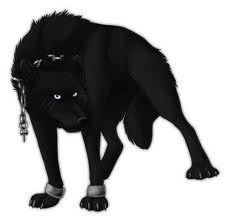
At a very bleak time in my life, I decided to go and do Judith Hanson Lasater’s “Relax and Renew” training in London (www.judithlasater.com). It was one of the wisest decisions I ever made. Five days of training with Judith, (without compare one of the most grounded, funny, wise people I have ever met), learning the gentle art of Restorative Yoga. It made me realise how ready to burn out my nervous system was. Even with the clean living and the therapy, my mind was like a stationary car with a brick on the accelerator, noisy, polluting and liable to explode, not to mention very, very tiring. I remember reading an article I think by Anna Blackmore (Anna was one of my teachers at Yoga Campus where I trained) who said that she was told by a yoga guru in India that if she was depressed then the medicine was Deep Rest. Sounds a bit “Love Guru” I know (Mike Myers film…ridiculous but quite good for a chuckle). But there is a nugget of truth in there. I have always been a mile a minute sort of a gal. Lists, deadlines, I thrive on all that, conquering tasks, coming first, being a perfectionist, yes, yes and yes! And the person I was most often in competiton with? Me of course! And was I ever satisfied? Hell no. I would always miss the ‘moment’, because I had one eye on what was going to happen next. And restorative yoga did not come easy to me; I was very happy doing twelve rounds of sun salutations standing on my hands or head, preferably to banging house music, but lying on the floor in a supported hip opening position for minutes on end, in silence, following the breath and acknowledging how I was feeling and what I was thinking?……..Scarey. So I began to change my practice, and I felt the benefit. I still love my strong practice, but I have to temper it with stillness, restorative yoga, pranayama, meditation and sometimes just savasana (relaxation).
Backbends were a big part of my process. And funnily enough, I never liked them. After an hour on the mat gently layering up backbends, I would sometimes then be able to go food shopping without crying instead of just sitting in the dark looking at the wall, leaking tears. Now that may not sound very inspiring, but believe me, when you have kids to feed, and you are a solo parent, you have to get to the supermarket!
It was around that time that I read “Yoga for Depression” by Amy Weintraub (and am reading it again now) and started to learn some breathing techniques to get me out of the hell of being trapped behind the perspex wall of numb that separated me from the rest of the world. The results are subtle but real. (I remain disappointed that the main technique she alludes to in the book “Sudharshan Kriya” is never explained or revealed, as it is only taught by people that have undertaken the “Art of Living” course….hmmmmmm. There is however plenty of information on the internet about this technique, though personally I would only feel comfortable learning a technique such as this one from a qualified teacher. Pranayama is powerful stuff in my humble opinion, and not to be dabbled with without good guidance).
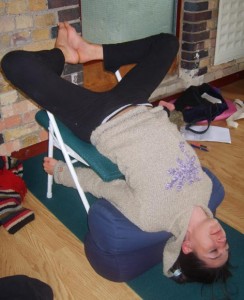
This lead to more exploration of the breath, Donna Farhi’s exemplary “The Breathing Book” is always in my yoga bag, and well worth a read. And it seemed quite simple to me. Basically Yoga delineates three states of being, or Guna’s if you want the fancy word. (There is an older post on the Guna’s called “Three’s a Charm” by Richard Rosen if you want more detail)
Tamas = inertia
Rajas = passion
Sattwa = balance/harmony/equanimity
And these had enormous resonance with my mental unrest. I could identify Tamas in my bleak depressions, the days when getting out of bed felt like trying to trudge through quicksand whilst recovering from a general anaethetic and wearing really heavy wet boots. I could relate to Rajas in my more manic phases, when I couldn’t sleep, eat, think and my mind whirred and whirred and whirred and I could not settle not even enough to read or watch TV (my house was very very clean though and I still have a tidy loft so there have been some lasting positives……)
Sattwa? Not so familiar, but I yearned for it, I really did. For some time I had just wanted to feel OK, not high, not amazing, just OK. And that seemed like what Sattwa was all about. I wanted to be free of anything ‘extra’ and still to feel OK. It did not seem like a lofty aim. To just enjoy the “Daily-ness of Life.” I did not want to swing from one ‘event’ to another to give meaning to my life. I twinned my recovery with a period of celibacy of nearly three years duration, because I did not even want to use the ‘high’ of a new relationship or sex to make me feel alive. I wanted to find my baseline. And I did. With the help of my therapist Lara, my yoga, my friends (you know who you are, “my wives” ) I found my Sattwa. What a relief. That life could be bumpy but I could be level. That a pothole in the road did not send me spinning out of control. It was just a bump in the road. I had choices. I could be well and happy.
And then twenty months ago, my brother died. He was 45, a Dad, a husband, a very loved son. He was on his motorbike on his way to work. It was an accident and he was gone. And I lost my Sattwa. And I am still trying to find it. I don’t cry when people die, maybe I am a bit weird that way. Grieving for my friend was hard enough. There was love between us, and understanding and we were close. Grieving for my brother was a different story. We were not close. I had not seen him or spoken to him in over three years. At the funeral one of his friends told me that my brother had been angry with me over something that had happened between us, which explained the long period of no contact. What I wasn’t expecting was a return to the dark place so insidiously, so completely, and I didn’t even know it had happened at first. After all that work. All that progress. I thought I had taken the Black Dog to the vet and had it humanely put to sleep. And out he slunk from the shadows and bit me fair and square hard on the arse. For the past twenty months I have been back on the journey towards peace, and it has been so very much harder this time. So back to the formula, cleaner living, though not to the same extent as the first time around, (at least, not yet…) daily yoga, back into therapy (I had originally made a joke about how she must have suffered having me rock back up in her office, but I can hear her saying “Are you using humour to hide how you feel?” Busted!!!) Out came my old battered copy of “Beautiful Life” by Simon Parke, because it has always been my intention to live a beautiful life, and here is a short snippet, one of my mantras…..
“You alone are the alchemist of your humanity. The power is given to you alone to turn base metal into gold, to turn such base energies as fear, worry, anger, deceit, hatred and delusion into generosity, openness, spontaineity, kindness, courage and awareness. This is your genius.”
Out came my incredibly tatty copy of “The Road Less Travelled” by M.Scott Peck that I have had since I was eighteen. And I realised. I had been sitting on my laurels. I thought I was ‘there’ and didn’t have to work on myself anymore. How arrogant was that! We are a work in progress aren’t we? All of us?
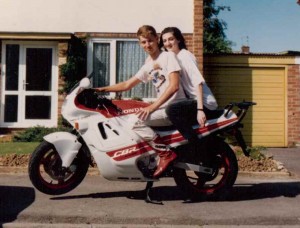
It was tougher this time around, and there were a few comments about me going back into therapy “Isn’t it a bit self-indulgent?” “But you’re alright aren’t you?” “Are you using it as a crutch?”
Once again I will hide behind M.Scott Peck:
“The use of psychotherapy is no more a crutch than the use of hammer and nails to build a house. It is possible to build a house without hammer and nails, but the process is generally not efficient or desirable. Few carpenters will despair of their dependency on hammer and nails. Similarly, it is possible to achieve personal growth without employing psychotherapy, but often the task is unnecessarily tedious, lengthy and difficult. It generally makes sense to utilise available tools as a shortcut”
I also went for some Emotional Conflict Resolution Therapy with Linda Kearney as if ever there was a girl in emotional conflict…..twas me. I did not know how to grieve. I have lost seven people from my family in my adult life, two to cancer, three murdered, one heart failure and a motorbike accident, and I have been dry eyed at every funeral. Linda taught me some pranayama (breath/energy) techniques, and some visualisations and affirmations that have become a staple part of my practice. And now, I cry.. at last……
After my brother’s death, for a while I felt like a rag doll that had spent three year climbing a mountain, only to be thrown back down to the bottom by a petulant child. But I had not been thrown. I am not that helpless. I had just stopped climbing, I had stopped holding on, so I fell. I think that’s just down to gravity. But I wasn’t at the bottom. It looked like the bottom, but I think I landed on a little ledge just a little way off the bottom. I believe we progress in spirals, so sometimes it looks very much as if we are back where we started, but we may have travelled around in a big wide spiral, and after lots of work and progress we peer over the edge and panic that we are back where we started but we are not. OK we may only be an inch higher up, but that will do for me. I am now 45, (you might be able to guess why that freaks me out at times..) and I am keenly aware of how short this sweet life is, as Bonnie Raitt said “Life feels so much more precious when there’s less of it to waste” (and who is Bonnie Raitt? A ginger country and western singer that I love, one of the great things about being middle aged is you don’t care about being terminally uncool anymore!) And I don’t want to waste it. The Black Dog is currently tied up in a corner while I play the piano (Black Dogs hate music) if it growls I hit it over the head with a rolled up newspaper. I have only started playing the piano again since my brother died, my Dad introduced me to the music of Phamie Gow (www.phamiegow.com) and something about it opens up a space inside my heart, it can be painful, but also uplifting and somehow liberating. Like a backbend. I sit and play “Peace Song” and I feel at peace. And I count my blessings. From the death of my brother I have reconnected with my parents. I am back at the piano. I have been able to feel more compassion for my students suffering through bereavement and grief. I have realised how fallible and fragile I am and I am OK with that.
I will leave you with a poem that made me smile when I first went into therapy, absolutely convinced that all of my problems were not my fault, and therefore how could I change?
“There’s A Hole In My Sidewalk: An Autobiography in Five Short Chapters” by Portia Nelson
Chapter I: I walk down the street.
There is a deep hole in the sidewalk.
I fall in.
I am lost…
I am helpless.
It is not my fault.
It takes forever to find my way out.
Chapter II: I walk down the same street.
There is a deep hole in the sidewalk.
I pretend I don’t see it.
I fall in.
I can’t believe I am in the same place.
But it isn’t my fault.
It still takes a long time to get out.
Chapter III: I walk down the same street.
There is a deep hole in the sidewalk.
I see it there.
I still fall in…It’s a habit.
My eyes are open.
I know where I am.
It is my fault.
I get out immediately.
Chapter IV: I walk down the same street.
There is a deep hole in the sidewalk.
I walk around it.
Chapter V: I walk down another street.
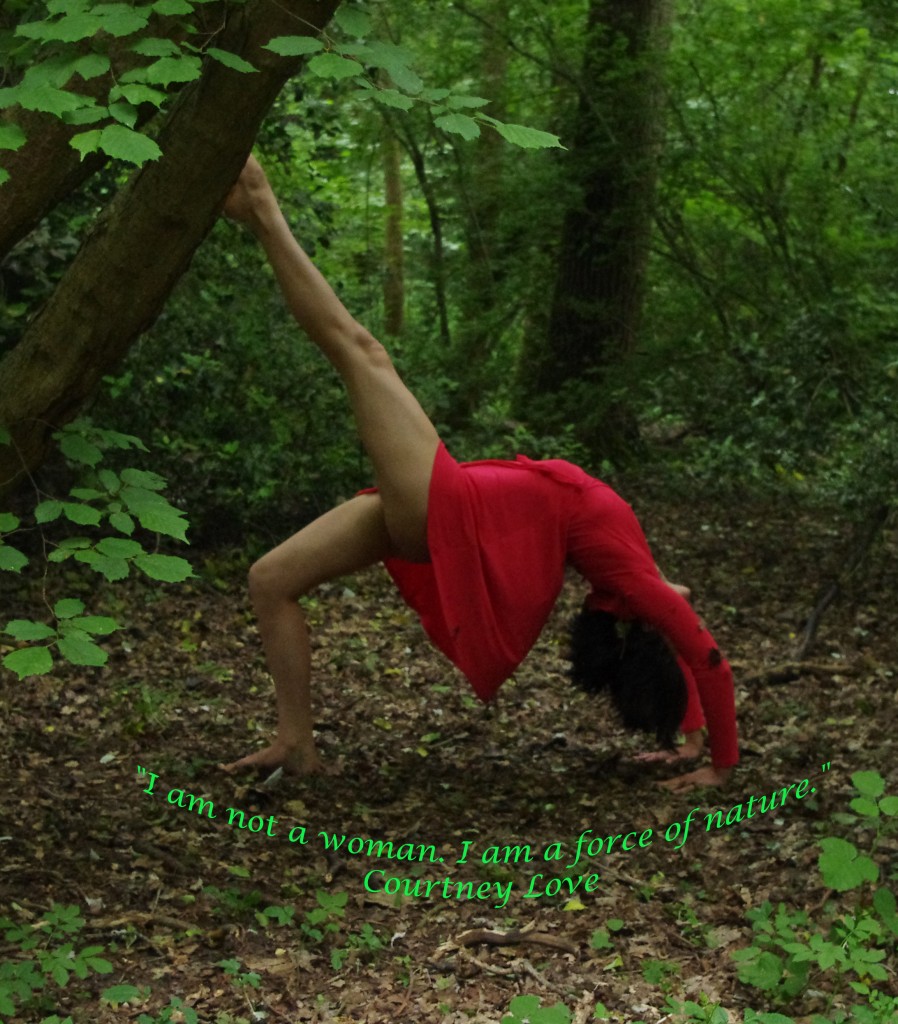
(Thanks to Sree Bandi, one of my students for giving me this caption for the picture!)
Resources
Patrick Elleverton “Taming the Black Dog”
M.Scott Peck “The Road Less Travelled”
Amy Weintraub “Yoga for Depression”
Judith Hanson Lasater “Relax and Renew” www.judithlasater.com
Simon Parke “The Beautiful Life”
Linda Kearney Yoga Therapist 0751 8913052
www.bacp.co.uk for a list of psychotherapists in your local area
www.phamiegow harpist and pianist.Music available on CD and sheet music.

Well my beautiful woman, i bloody well enjoyed reading that, it brilliant!!!!
I am so very proud and happy to have you as my friend
Ilove you lady, very much xxxxxx
Hi Em, thanks hon, right back at you, you are one of the ‘wives’ I referred to in the article. Having close friends who accept you as you are (even when one is ‘hurtling around one’s wigwam in a voodoo rage’ is one of the most precious experiences we can have an humans. Love you too xxx
I feel like I connected with you so much when reading your story, my life has been totally different in many ways but I’ve been on parts of a similar journey and I’m only just knowing in my body what peace feels like and that it is OK to stay here, every day I battle dark, all en-compassing emotions like right now and have learnt to not push them away or dwell on them – to feel them completely and let them pass. It was a real honour to read about your life, I am truly privileged to have met you and to now join you for part of your journey xxx
Thank you for sharing this Michelle. You write about the struggle with depression so openly and with such amazing grace and humour; it’s inspiring stuff. I have a very dear friend, someone who sounds so like the close friend that you tragically lost, who is struggling to keep her own black dog at bay. She doesn’t want to die (despite a few attempts), but, she says, she doesn’t want to live either. She is, however, a keen reader and has found some solace in the words of others before so I will be sure to pass on these sources to her. Thank you and good luck in your journey. X
I really appreciate your unerring honesty in writing that………its a tough read, but also incredibly inspiring, you are a fantastic teacher in so many ways, and the fact that you have taken the time to share these incredibly personal and private details of your life reaffirms that, hope you will always be able to keep your black dog under control and in his corner xxxx
I do love this brave and beautiful writing from the fearless Michelle. I truly enjoyed reading this and I now better understand where your compassion stems from. I so admire the strength and lucidity that cuts through everything – even when you are sharing such a challenging topic. MAY THE FORCE BE WITH YOU!
Thank you for sharing. your story is very similar to mine and in the dark it is so comforting to know you one is not alone. Celibacy was an integral tool in repairing my vessel so I could hold joy at a steady flow from source. i am returning to that after a breakup with a man, who I allowed to posess my dreams. I am a force of nature. THANK YOU FOR SHARING